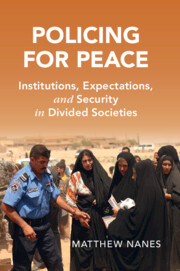Book contents
- Frontmatter
- Contents
- List of Figures
- List of Tables
- Preface
- Acknowledgments
- 1 Introduction: The Challenge of Institution-Building in Divided Societies
- 2 Power Sharing, Policing, and Peace
- 3 Sectarianism and Conflict in the Iraqi Police
- 4 Identity and Inclusion in the Israeli Police
- 5 Perceptions
- 6 Police Integration and Anti-Government Violence
- 7 Citizen Cooperation and Crime
- 8 Barriers to Integration
- 9 Conclusion: Peace-Building through Institutional Inclusion
- Appendix A Data and Methods
- Bibliography
- Index
- Seriespage
6 - Police Integration and Anti-Government Violence
Published online by Cambridge University Press: 12 November 2021
- Frontmatter
- Contents
- List of Figures
- List of Tables
- Preface
- Acknowledgments
- 1 Introduction: The Challenge of Institution-Building in Divided Societies
- 2 Power Sharing, Policing, and Peace
- 3 Sectarianism and Conflict in the Iraqi Police
- 4 Identity and Inclusion in the Israeli Police
- 5 Perceptions
- 6 Police Integration and Anti-Government Violence
- 7 Citizen Cooperation and Crime
- 8 Barriers to Integration
- 9 Conclusion: Peace-Building through Institutional Inclusion
- Appendix A Data and Methods
- Bibliography
- Index
- Seriespage
Summary
The implementation of democracy in Iraq in 2004 shifted the balance of power between Sunnis and Shias, creating a security dilemma in which the Shia-dominated state struggled to credibly commit to positive future treatment of the newly weakened Shias. I propose that police integration addresses this commitment problem because it gives included groups reason to expect better treatment, and because it is costly for the state to renege on police integration once implemented. I first show that Iraqi Sunnis, who believe the police are integrated interpret service provision as fairer, perceive that their group has better access to government jobs and expect less future repression by the police or the government. These outcomes map onto commonly identified motives for conflict, including horizontal grievances, unemployment, and the commitment problem. I then test the link between integration and support for violence. Using an experiment embedded within the survey, I find that Sunnis exposed to information that the police are integrated are significantly less likely to support anti-state violence.
- Type
- Chapter
- Information
- Policing for PeaceInstitutions, Expectations, and Security in Divided Societies, pp. 117 - 139Publisher: Cambridge University PressPrint publication year: 2021

